|
This next SWIFT Early Career Framework (ECF) Extra session on High Expectations and Behaviour was led by Professor of Social Mobility at Plymouth Marjon University, Sonia Blandford and Retired Headteacher of a PRU and Educational Consultant, Wendy Casson MBE. The “Extras” are free optional sessions available to SWIFT Early Career Teachers and Mentors and their wider school setting to enhance their experience on the ECF and benefit their reflection and practice in their classroom. Founded on 80 years of combined teaching experience and enthusiasm aplenty, Sonia and Wendy’s love of education, teaching and children was palpable and is also rooted in their backgrounds. Wendy comes from a background of a family of six children who were nurtured by their parents according to their different needs and nurturing has been part of Wendy’s practice as a teacher and school leader. Sonia and her twin were part of the Born to Fail study for their first 15 years (which is also the title of one of her books). Financed by a grant from the national Children's Home, the Born to Fail study looked at socially disadvantaged children born in Britain in the week of 3 - 9 March 1958. As children, Sonia and her sister did not care, because those around them did not care; which included failing her English Language O Level five times – although she has made up for it with her prolific 55 published books. There needs to be care and support. Commit, control and inspire pupils and young people to be curious about what they do, about what teachers do, and to be curious about the context and the standards of behaviour. Teaching is a learning journey for everyone. Even when it gets tough, it is a learning experience. Teachers should not always blame themselves. “Embrace the trips and slips.” If a lesson does not work, consider the many other external reasons and events that might be taking place at home. For example, the pupil might be a young carer with family pressures. An understanding of children’s backgrounds can help to support them in school and in addition, an awareness of the cyclical pattern of parents who failed at school and do not know how to parent their own children. The past will affect the present. This needs to be a whole school approach. “Go into the classroom in a positive way and speak to colleagues in a positive way.” Share your good practice and any concerns. Reduce the impact of toxic stress and support children more effectively by helping them to learn emotional self-regulation, show unrelenting positivity and kindness and use language that reduces stress rather than increases it. Relationships are key in school. “You’ve got to give what’s inside you.” Children can work out the frauds and if you do not want to get to know the children in your class, they will not want to get to know you. Maintaining boundaries, of course. Developing strong relationships with parents at home is equally important, and requires the development of skills to enable positive relationships with parents. Involve the parents every step of the way. Consider the six Principles of Nurture: Transitions for children that involve them stepping out of their safe environments can be managed. From home to primary school, then to secondary school and even consider the challenging and sometimes traumatic transitions between lessons. Teachers need to be flexible through the school day. We are all learning. “If we can’t teach to the children, then we can’t teach.” If a child does not (appear to) want to learn, the issue might be that the lesson needs to be pitched in a different way to meet their primary needs. Maintain high standards, and engage with every pupil and know them and understand how they learn. Be aware of misconceptions. If a child will not sit still, it might be that they need a sensory assessment and/or they might have an undiagnosed/ unmet behaviour or learning need. If a teacher is shouting all the time, they have lost control. On-call systems risk disempowering the teacher as the pupil perceives that that teacher does not want them in the class or cannot teach them if, and when, they are withdrawn from their lesson for poor behaviour. Learn from experience. Talk to the child. Confront without confrontation. “Most children love coming to school, some come to school to be loved…” When children feel safe and loved they will thrive and need the following eight things to thrive:
Rather than changing the child, change the support around them, which requires the skills to support the young person. Key Takeaway Action Points
SWIFT thank Sonia and Wendy for leading this insightful and positive session on High Expectations and Behaviour, which was a collaborative effort between Plymouth Place-Based School Improvement, Plymouth Marjon University and SWIFT. The next session in the series will take place on Thursday 18 May 2023 at 1600 and delves into 'inclusive practice' in all classrooms. Look out for more information in the ECF Programme Weekly Newsletter. By Jude Owens, PA to the SWIFT Executive Team
0 Comments
Your comment will be posted after it is approved.
Leave a Reply. |
SWIFT News
|
SPONSORED BY
Join us, be a part of our SWIFT community |
© COPYRIGHT 2022 SOUTH WEST INSTITUTE FOR TEACHING SWIFT. ALL RIGHTS RESERVED | Website by brightblueC
VIEW OUR PRIVACY NOTICES | VIEW OUR COURSE T&CS
VIEW OUR PRIVACY NOTICES | VIEW OUR COURSE T&CS


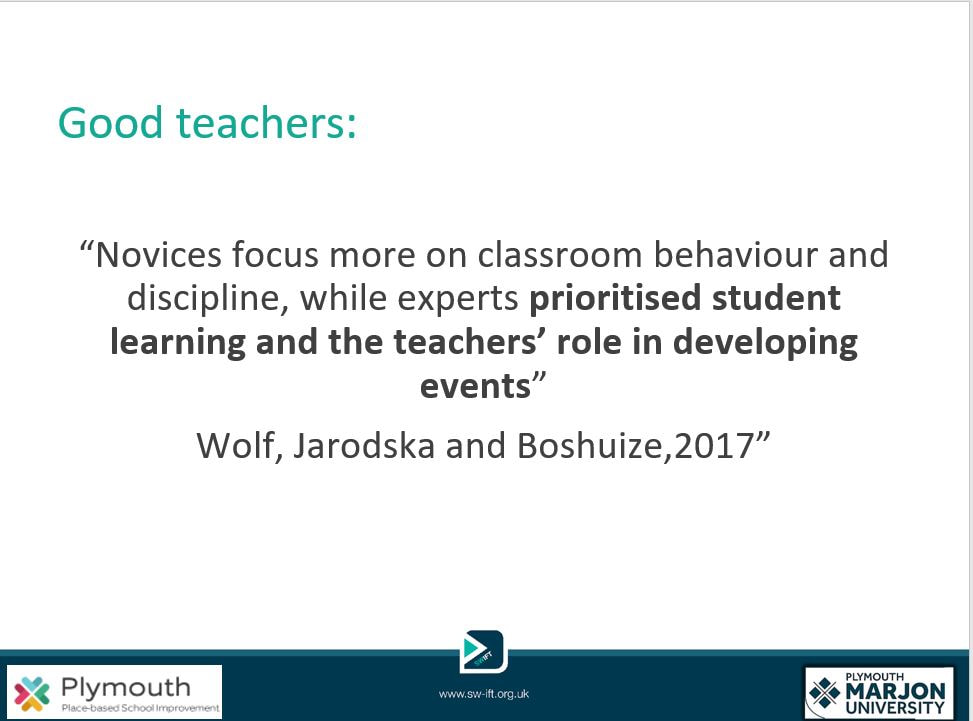
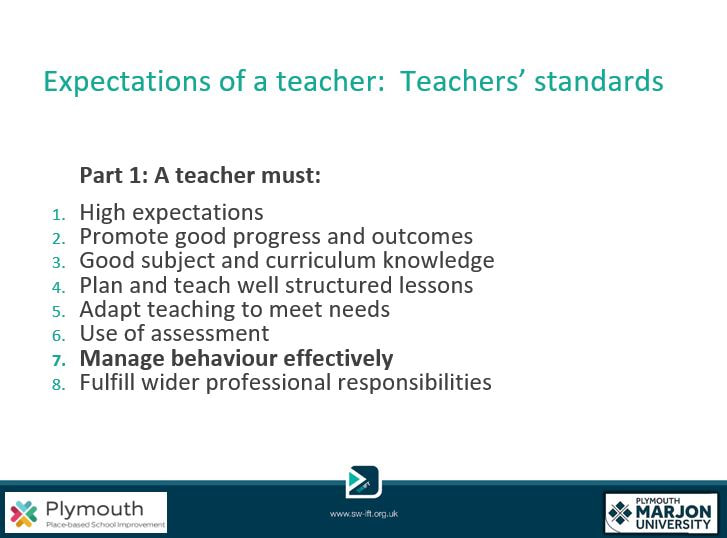
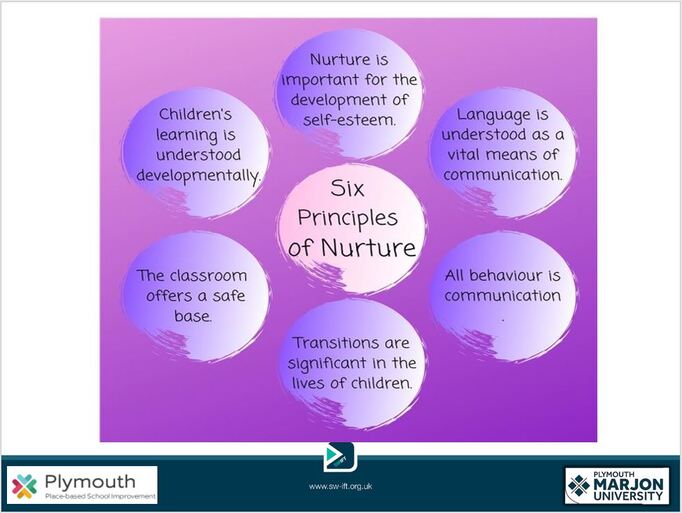
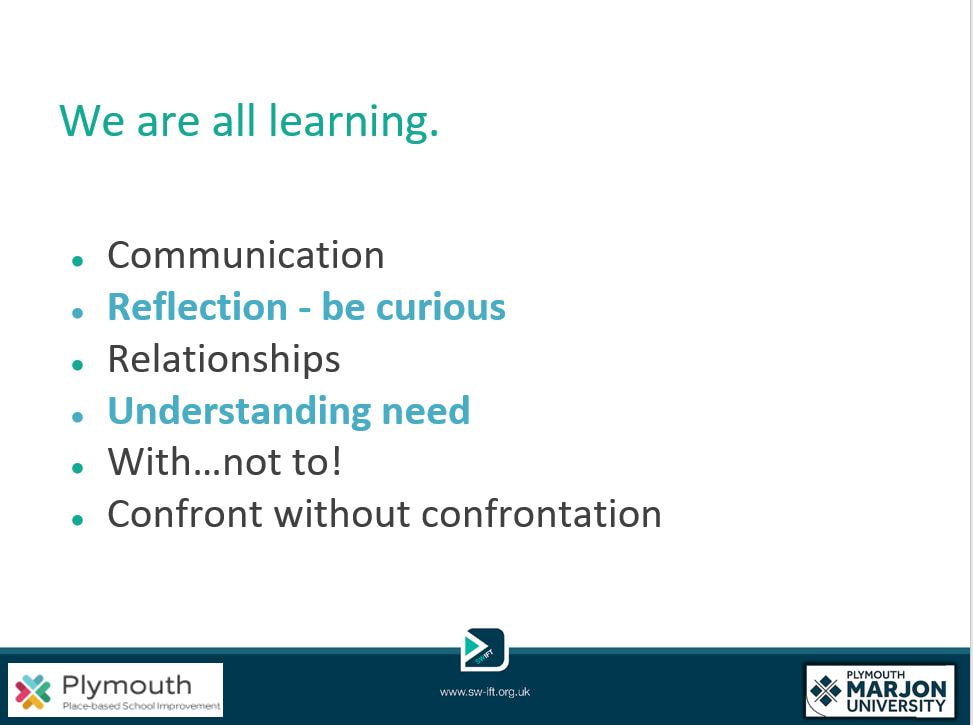
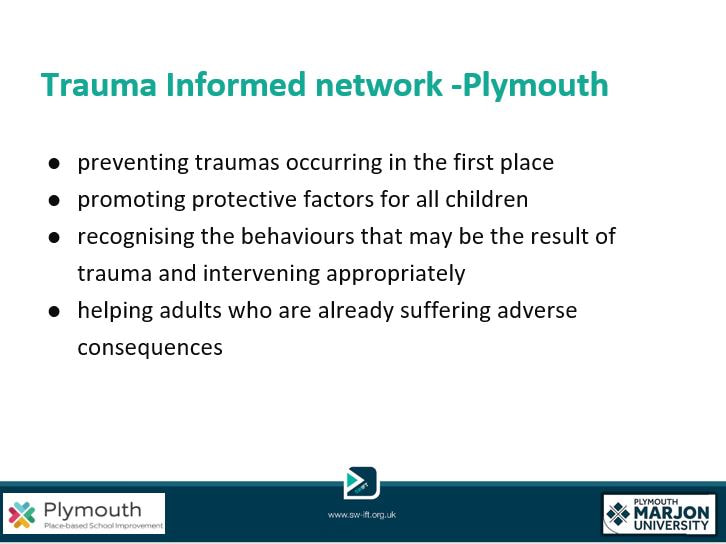

 RSS Feed
RSS Feed





